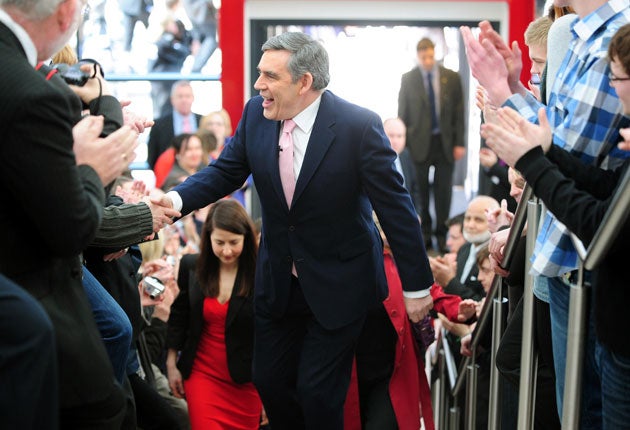Economic recovery is my top priority, says Gordon Brown
PM puts nation's finances at heart of campaign, as Cameron fights back with call for change

Your support helps us to tell the story
From reproductive rights to climate change to Big Tech, The Independent is on the ground when the story is developing. Whether it's investigating the financials of Elon Musk's pro-Trump PAC or producing our latest documentary, 'The A Word', which shines a light on the American women fighting for reproductive rights, we know how important it is to parse out the facts from the messaging.
At such a critical moment in US history, we need reporters on the ground. Your donation allows us to keep sending journalists to speak to both sides of the story.
The Independent is trusted by Americans across the entire political spectrum. And unlike many other quality news outlets, we choose not to lock Americans out of our reporting and analysis with paywalls. We believe quality journalism should be available to everyone, paid for by those who can afford it.
Your support makes all the difference.The simmering pre-election campaign began in earnest yesterday, as both main party leaders began to make their case for becoming Prime Minister in six weeks' time.
Gordon Brown revealed that securing the economic recovery and making government more accountable would be the core themes of Labour's campaign, as he unveiled five election pledges. In a speech to Labour activists and candidates, the Prime Minister presented "substantial, deliverable and carefully costed" pledges to raise living standards, protect frontline services, strengthen fairness and build a hi-tech economy.
And, in an echo of Tony Blair's mantra that his top three priorities were "education, education, education", he added: "When people ask what are my top three priorities for the country, let me tell them: keeping on the road to recovery, keeping on the road to recovery, keeping on the road to recovery."
But the rallying cry to the Labour movement was swiftly met with a riposte from David Cameron, who warned Conservative activists that they had "40 days and 40 nights to make our case and to bring change to this country".
As the tension mounted in advance of an election expected on 6 May, the Tory leader said he had thought Mr Brown might have "finally summoned up the courage" to confirm the date – but said instead he was taking people for "fools".
These exchanges offered the most telling evidence yet that all parties were reaching the end of the "phoney war", before the real election campaign begins.
While cabinet colleagues were campaigning across the country, Mr Brown used his speech in Nottingham to continue Labour's tradition of issuing a "pledge card" sketching out details of the party's policy priorities if Labour is returned to office. And, after an opinion poll suggested Labour was more trusted on the economy than the Tories, following the Budget last week, he made it clear that the recovery would be a major battleground.
The Shadow Chancellor George Osborne is also believed to be planning to cancel next year's planned rise in National Insurance contributions.
"The economy is more central and the choice more serious in this election than any time in my lifetime," the Prime Minister said. He also said cabinet ministers would have to sign up to public, annual contracts outlining what they were expected to deliver.
Mr Brown prepared for his rallying cry by attempting to settle an enduring internal row that has threatened the stability of the Government for several months. The Prime Minister used an interview with The Guardian to confirm that he would keep Alistair Darling on as Chancellor if Labour wins the election. The surprise declaration, after a series of rows between the two men over economic policy, was followed by an endorsement from the Schools Secretary, Ed Balls – identified as Mr Darling's most likely successor when the Prime Minister was trying to unseat him last year.
But Mr Cameron immediately launched a counter-attack against the Prime Minister's proposals, claiming he was "taking people for fools [and] not deserving re-election". The Tory leader told an audience in Milton Keynes that there was a "big choice" at an election which was, at most, 40 days away. He added: "That is the time that we've got left to win this great argument – do you want to stick with what you know or do you want change with the Conservatives?"
The Liberal Democrat leader, Nick Clegg, said: "Labour and the Conservatives have failed to come up with a single specific positive reason for people to vote for them."
Mr Brown was dealt a blow last night as the News of the World announced it was backing the Tories , after supporting Labour at the last three general elections . The paper said the country was "crying out for change". It also carried an ICM poll showing the Tories on 39 per cent, up one point on last week, while Labour was down one on 31 per cent. A BPIX poll for the Mail on Sunday suggested the Tory leader was leading by 41 per cent to 27 in the crucial battle for female voters – and, at 37 per cent overall, seven points ahead of Labour.
However, a YouGov survey for The Sunday Times suggested Labour had narrowed the gap from seven to five points in a week.
Join our commenting forum
Join thought-provoking conversations, follow other Independent readers and see their replies
Comments